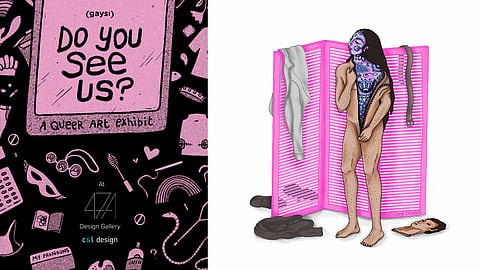
- HOMEGROWN WORLD
- #HGCREATORS
- #HGEXPLORE
- #HGVOICES
- #HGSHOP
- CAREERS
- ABOUT US
- CONTACT US

The Supreme Court ruling on September 6th, 2018, which read down Section 377 of the Indian Penal Code, was an epoch-making moment for the homegrown LGBTQIA+ community. This weekend onwards, marking the fifth anniversary of the groundbreaking hearing, Gaysi Family — the media platform holding space for queer desis since 2008 — has put together a sprawling, eclectic culmination of visual creations titled Do You See Us? at 47-A, Khotachiwadi in Mumbai in synergy with C&L Design.
Cherrypicked from the repertoire of over 40 visual artists, this exhibition unravels the stigma and stereotypes still lingering in the aftermath of decriminalisation, through contemporary illustrations, photography and digital art among other forms of creative storytelling. "In terms of curation, we wanted to talk about rights and share stories in the queer space and look at how it has evolved since the verdict of 2018," says Sakshi Juneja, the lifeblood of Gaysi Family. Sakshi believes in finding a commonality between queer and non-queer people through cultivating conversations “so there is empathy from both sides and not just a single way transaction.”
The Gaysi prerogative for this year is to stake their claim in the public domain, no longer insulated by earmarked safe spaces and move past the ostracism that circumscribes their day-to-day experiences. The artistic medium in India has elevated the struggles and experiences faced by marginalised communities in navigating the majoritarian stigma with an elegance and starkness that couldn’t be expressed better through speeches or panel debates on national television.
While the curation was too comprehensive for us to cover everyone, Homegrown reached out to a handful of queer illustrators from the lineup to get a sense of the creative impetus behind the work they chose to display and how it ties in with the exhibit's leitmotif of reclaiming the queer gaze in art and public spaces. You would just have to swing by 47-A Design Gallery in Khotachiwadi to witness the entire, shining ensemble.
A neoteric zine to be launched on September 2, 2023 as part of the exhibit, House of Cards strives to represent the A-Spec community — an umbrella term for asexual and aromantic orientations — and create awareness not only about their existence, but also the unique way they experience the world as a result of their amatonormativity. Lex, who wrote and illustrated this zine during their year-long internship at Studio Kohl, based the characters on the Ace of Hearts (representing AlloAce) and Ace of Spades (AroAce) symbolism prevalent within the A-Spec community.
A young Agender, AroAce artist (he/they), Lex hopes that by sharing meaningful experiences, “Asexuality and Aromanticism won’t be as invisible” as when they were growing up.
Varsha Panikar’s (they/he) mixed media series Origami Folds scrutinises the loss of autonomy and commodification of the body, through the periscope of trans-South Asian lives, to reclaim “the narrative of queer lives from within and challenging the prevailing status quo.”
According to Varsha, their selected photography and poetry are enmeshed seamlessly within the exhibit’s overarching theme, while serving as a conduit through which they can express the unspoken parts of them that are yearning to be “heard in pursuit for authenticity”.
Nu Misra (They/He), Founding Editor of Revival Disability India, chose illustrations for ‘Do You See Us?’ that invoke their journey of self acceptance, as they endeavour to colour outside “the designated able-bodied lines of the world.” When they formed the Revival Disability Collective, their underlying goal was “to create an accessible revolution which everyone can be a part of," designing content that disabled folk can relate to.
All the pent up frustration of being constantly dehumanised and invisibilized found its way into Nu’s artwork.
Syed Ali Arif (he/him) is a contemporary artist and actor, whose Oh My Gawd series explores how everything today comes with a price tag, “including love”. His paintings inhabit a very personal iconography, richly alive with his childhood devotion for Sridevi, sculptural masculinity and his aesthetic preoccupation with nudism in art. Sridevi is not just a hush-hush queer icon for him, but a pillar of strength whose films and music videos teleports him into a parallel universe of glamour and romance. Syed is presently exploring digital art and often dabbles in self-portraits as a gesture of reconciliation with his sexuality.
Patruni Chidananda Sastry (they/them) is a bisexual, gender non-binary person who does drag to create political imagery in public spaces and hold space where such beautiful contradictions can co-exist. Case in point being the self portraits they chose for the exhibition, Side by Side and Drag Dad that evince the possibilities of queerness welding into the matrix of family life as Patruni stands side-by-side with their partner who is a cis gender woman. Drag Dad is a brazen challenge to those who deem drag is not appropriate for children, where Patruni is captured holding their newborn while in full drag regalia, piquantly reclaiming their right to parenthood.
Following the reading down of Section 377, intimacy between consenting adults (irrespective of gender) and the inclusion of sexual orientation within Article 15 are not the only big focal points for queerness. The new milestones ahead of the community involve stay relevant, visible and significant in the public sphere without being alienated or 'othered'.
Besides the artwork on display, ‘Do You See Us?’ promises a sensorial immersion through art walkthroughs, panel discussions and musical performances that audaciously delineate the lived experiences of queer individuals so onlookers may stop and reflect — in a bid to see beyond the limitations of gender or sexuality and recognise the humanity within.
EVENT DETAILS:
Date: September 2-3 and 5-6, 2023 (Gallery closed on Mondays)
Venue: 47-A: Design Gallery in Khotachi Wadi, Mumbai
Entry: This is a free event. Just walk in!
